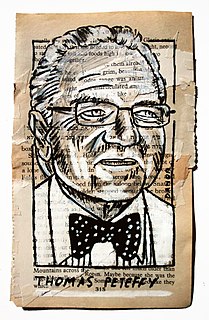A Quote by Felix Frankfurter
The words of the Constitution... are so unrestricted by their intrinsic meaning or by their history or by tradition or by prior decisions that they leave the individual Justice free, if indeed they do not compel him, to gather meaning not from reading the Constitution but from reading life.
Related Quotes
We current Justices read the Constitution in the only way that we can: as Twentieth Century Americans. We look to the history of the time of framing and to the intervening history of interpretation. But the ultimate question must be, what do the words of the text mean in our time. For the genius of the Constitution rests not in any static meaning it might have had in a world that is dead and gone, but in the adaptability of its great principles to cope with current problems and current needs.
I started my professional life as a philosopher of language and for several years took the orthodox line that meaning is an essentially linguistic phenomenon. Whether as a result of simply listening to everyday talk about meaning, or reading books of anthropology, sociology and art history, it dawned on me that there is nothing at all privileged or central about linguistic meaning.
"What is the meaning of life?" This question has no answer except in the history of how it came to be asked. There is no answer because words have meaning, not life or persons or the universe itself. Our search for certainty rests in our attempts at understanding the history of all individual selves and all civilizations. Beyond that, there is only awe.
Are we reading the Constitution and pondering it? Are we aware of its principles? Are we abiding by these principles and teaching them to others? Could we defend the Constitution? Can we recognize when a law is constitutionally unsound? Do we know what the prophets have said about the Constitution and the threats to it?
The interpretation of the laws is the proper and peculiar province of the courts. A constitution is, in fact, and must be regarded by the judges, as fundamental law. It therefore belongs to them to ascertain its meaning, as well as the meaning of any particular act proceeding from the legislative body. If there should happen to be an irreconcilable variance between the two, that which has the superior obligation and validity ought, of course, to be preferred; or, in other words, the Constitution ought to be preferred to the statute, the intention of the people to the intention of their agents.
The best reason to be assigned, in this case, for not having made the Constitution more free from a charge of uncertainty in its meaning, is believed to be, that it was not suspected that any such charge would ever take place; and it appears that no such charge did take place, during the early period of the Constitution, when the meaning of its authors could be best ascertained, nor until many of the contemporary lights had in the lapse of time been extinguished. How often does it happen, that a notoriety of intention diminishes the caution against its being misunderstood or doubted!
My construction of the constitution is very different from that you quote. It is that each department is truly independent of the others, and has an equal right to decide for itself what is the meaning of the constitution in the cases submitted to its action; and especially, where it is to act ultimately and without appeal.

































